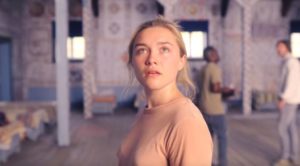At the end of MIDSOMMAR, our much put-upon heroine, Dani (Florence Pugh) smiles. It’s her first real smile of the film, and how she got there is a tale of bucolic splendor, ecological harmony, and psychic terror. Brought to us by Ari Aster, the iconoclastic mind behind HEREDITY, it finds in parable and metaphor the terrors of relationships and, of course, families, while also shaking up what is generally accepted as the norm in our society. It imparts a disquieting sense that it might be best to not scratch too deeply beneath the surface of how we do things.
At the start of MIDSOMMAR, Dani experiences a devastating loss at the hands of her bi-polar sister. Dani has her own issues with mental health, a situation that has left her boyfriend of four years, Christian (Jack Reynor) dithering about whether or not to break up with her now that their college years are coming to a close. Two of his roommates, fellow anthropology student Josh and bug-hating, horn dog Mark (William Jackson Harper and Will Poulter) campaign for him to drop her, while the third Pelle (Vilhelm Blomgren) remains silent. Perhaps it’s his natural Swedish reserve, or perhaps he is more compassionate. Whatever the motives, Dani is soon included in the foursome’s plan to visit Sweden for their nine-day midsummer festival in Pelle’s commune located in the deep woodlands, far beyond cell phone coverage or internet access. As Sherlock Holmes once observed, it is in those remote locations, unseen by others and beyond the reach of the law, where we are at our most vulnerable. Any fan of horror films know that a cabin in the woods or a similarly situated sleep-away camp confirms same.
The commune, Hårga, is a throwback to ancient Sweden and the Age of Aquarius. The buildings, full of odd  angles, are the essence of rusticity, even that yellow triangle of a temple that is off limits to the visitors. The people, universally warm and friendly, dress in white linen, often bedecked with flowers that bloom under the midnight sun. They dance folk-style, they eat communally, and they engage in ceremonies and rituals that start off with great charm and soon evolve into something savage. Depending on your point of view. After one particularly discomfiting interlude, apologies are forthcoming from the locals, with an explanation of how happy everyone was to participate in something that celebrates the circle of life and the joyous acceptance of same.
angles, are the essence of rusticity, even that yellow triangle of a temple that is off limits to the visitors. The people, universally warm and friendly, dress in white linen, often bedecked with flowers that bloom under the midnight sun. They dance folk-style, they eat communally, and they engage in ceremonies and rituals that start off with great charm and soon evolve into something savage. Depending on your point of view. After one particularly discomfiting interlude, apologies are forthcoming from the locals, with an explanation of how happy everyone was to participate in something that celebrates the circle of life and the joyous acceptance of same.
Aster’s great talent is the ability to telegraph what is about to happen, using the very sense of foreboding engendered to create an unbearable suspense as we wait for confirmation of our worst fears. His choices are impeccable. Setting the action in spaces of rigorous and monumental linear power in which the people are a mere component. There is also the contrast between the accepted normality of another way of viewing life of the commune, and the growing hysteria of the strangers who take it amiss. Aster’s point of view is decidedly with the latter, imbuing our norms with the outlier quality. Having subsumed the individual into the larger fabric of nature in this quaint spot, the Hårga-ites live rich lives of deep contentment, existing in a garden of earthly delights and mutual empathy. If there is any doubt about perspective being the supertext, there is deliberate bifurcation between what the roommates say to Dani’s face, and what they say behind her back, as well as the magic mushrooms with which they are greeted when they arrive at the outskirts of Hårga, not to mention that slick camera trick that shows the road and sky suddenly changing places as the Americans leave the city behind, reversing again when they reach the edge of the forest.

Florence Pugh
Special kudos to Pugh, in what could easily have been a thankless role as a perpetual whiner, valid reasons for that whining notwithstanding. This is a visceral performance more remarkable for its subtlety than for its histrionics, for the way it conveys strength instead of surrender. A vital component that carries not just her character’s arc, but the film’s credibility.
MIDSOMMAR is a film that is both clever and instinctive. By the time Dani smiles, we have been presented with a series of tableaux that are outside the pale, but somehow force us to consider the place of custom and usage in deciding where that pale lands in any given culture. And just how well what we take for granted might look to an anthropologist completely unfamiliar with our way of doing things. It makes for a wholly discomfiting, deliciously macabre experience.
Your Thoughts?